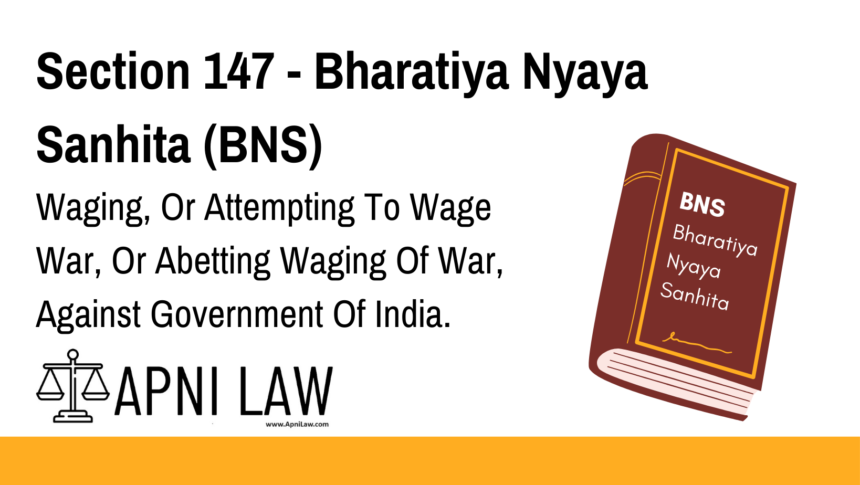Code
Section 147 – Waging, Or Attempting To Wage War, Or Abetting Waging Of War, Against Government Of India
Whoever wages war against the Government of India, or attempts to wage such
war, or abets the waging of such war, shall be punished with death, or imprisonment for life
and shall also be liable to fine.
Illustration.
A joins an insurrection against the Government of India. A has committed the offence
defined in this section.
Explanation
Section 147 of the Bharatiya Nyaya Sanhita (BNS), 2023, deals with acts of war against the Government of India. This section covers:
- Waging War: Actively participating in armed rebellion or war against the government.
- Attempting to Wage War: Making preparations, planning, or mobilizing resources to engage in war.
- Abetting War: Encouraging, funding, or supporting war against the government.
Key Elements of Section 147 BNS
- Offense Against National Sovereignty: Any action that threatens the stability of the Indian government.
- Severe Punishment:
- Death Penalty, or
- Life Imprisonment, and
- Fine.
- Covers All Forms of Rebellion: Insurrection, armed uprisings, and other activities aimed at overthrowing the government.
Legal Perspective
- This section is equivalent to Section 121 of the Indian Penal Code (IPC).
- It is one of the most serious offenses under Indian law.
- Acts such as terrorism, armed rebellion, or large-scale violent movements fall under this provision.
Illustration
- Example 1: Armed Insurrection
A joins an armed group rebelling against the Government of India. A has committed the offense defined in Section 147 BNS. - Example 2: Terrorist Attack
A group of individuals plans an armed attack against government establishments. Even if the attack is not executed, their planning itself qualifies as attempting to wage war. - Example 3: Providing Funds or Weapons
If someone financially supports or provides weapons to insurgents, they are guilty of abetting war against the government.
Common Questions and Answers on Section 147 BNS
1. What is the punishment for waging war against the Government of India?
The punishment can be death or life imprisonment, along with a fine.
2. What is considered “attempting to wage war” under this section?
Planning, gathering arms, recruiting people, or any preparation to start a war against the government qualifies as attempting to wage war.
3. How is “abetting” war defined in Section 147?
Abetting means supporting, financing, or encouraging war against the government. This includes funding terrorist organizations or supplying weapons.
4. Is rebellion or violent protest covered under this section?
Yes, if a protest turns into an armed rebellion or organized war against the government, it is covered under Section 147 BNS.
5. What other laws are applicable along with Section 147 BNS?
- Unlawful Activities (Prevention) Act (UAPA) – Covers acts of terrorism.
- National Security Act (NSA) – Allows preventive detention for security threats.
- Section 121 of IPC (Now replaced by BNS 147) – Similar provision under IPC before BNS was enacted.
Conclusion
Section 147 BNS is a strict legal provision to safeguard national security. It covers waging war, attempting to wage war, and abetting such acts. Given the severe punishment (death or life imprisonment), this section ensures that national integrity and stability are protected from acts of war or armed rebellion.
For more legal insights, visit ApniLaw today! 🚀








